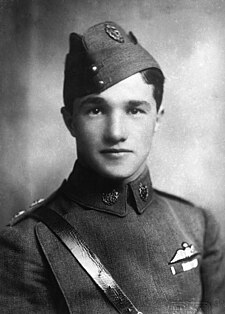
Back Albert Ball Afrikaans البيرت بول Arabic البرت بول ARZ Albert Ball Czech Albert Ball German Albert Ball Spanish آلبرت بال Persian Albert Ball French אלברט בול HE Albert Ball Hungarian
Albert Ball | |
|---|---|
 | |
| Born | 14 August 1896 Nottingham, England |
| Died | 7 May 1917 (aged 20) Annœullin, France |
| Buried | Grave 643, Annœullin Communal Cemetery, German Extension |
| Allegiance | United Kingdom |
| Service/ | British Army (1914–15) Royal Flying Corps (1915–17) |
| Years of service | 1914–17 |
| Rank | Captain |
| Unit | Sherwood Foresters (1914–15) North Midlands Cyclist Company (1915) No. 9 Squadron RFC (1915–16) No. 13 Squadron RFC (1916) No. 11 Squadron RFC (1916, twice) No. 8 Squadron RFC (1916) No. 60 Squadron RFC (1916) No. 34 Squadron RFC (1916–17) No. 56 Squadron RFC (1917) |
| Battles/wars | |
| Awards | Victoria Cross Distinguished Service Order & Two Bars Military Cross Légion d'honneur (France) Order of St. George (Russia) |
| Relations | Sir Albert Ball (father) |
Albert Ball, VC, DSO & Two Bars, MC (14 August 1896 – 7 May 1917) was a British fighter pilot during the First World War. At the time of his death he was the United Kingdom's leading flying ace, with 44 victories, and remained its fourth-highest scorer behind Edward Mannock, James McCudden, and George McElroy.[1]
Born and raised in Nottingham, Ball joined the Sherwood Foresters at the outbreak of the First World War and was commissioned as a second lieutenant in October 1914. He transferred to the Royal Flying Corps (RFC) the following year, and gained his pilot's wings on 26 January 1916. Joining No. 13 Squadron RFC in France, he flew reconnaissance missions before being posted in May to No. 11 Squadron, a fighter unit. From then until his return to England on leave in October, he accrued many aerial victories, earning two Distinguished Service Orders and the Military Cross. He was the first ace to become a British national hero.
After a period on home establishment, Ball was posted to No. 56 Squadron, which deployed to the Western Front in April 1917. He died when his plane crashed into a field in France on 7 May, sparking a wave of national mourning and posthumous recognition, which included the award of the Victoria Cross for his actions during his final tour of duty. The famous German flying ace Manfred von Richthofen remarked upon hearing of Ball's death that he was "by far the best English flying man".
- ^ Shores. British and Empire Aces of World War 1. p. 89.
© MMXXIII Rich X Search. We shall prevail. All rights reserved. Rich X Search